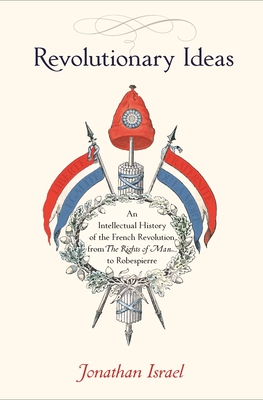

 Princeton University Press
Princeton University Press
Revolutionary Ideas: An Intellectual History of the French Revolution from the Rights of Man to Robespierre


Key Metrics
- Jonathan Israel
- Princeton University Press
- Paperback
- 9780691169712
- 9.1 X 6.1 X 1.9 inches
- 2.55 pounds
- History > Europe - France
- English
 Secure Transaction
Secure TransactionBook Description
How the Radical Enlightenment inspired and shaped the French Revolution
Historians of the French Revolution used to take for granted what was also obvious to its contemporary observers--that the Revolution was shaped by the radical ideas of the Enlightenment. Yet in recent decades, scholars have argued that the Revolution was brought about by social forces, politics, economics, or culture--almost anything but abstract notions like liberty or equality. In Revolutionary Ideas, one of the world's leading historians of the Enlightenment restores the Revolution's intellectual history to its rightful central role. Drawing widely on primary sources, Jonathan Israel shows how the Revolution was set in motion by radical eighteenth-century doctrines, how these ideas divided revolutionary leaders into vehemently opposed ideological blocs, and how these clashes drove the turning points of the Revolution.
In this compelling account, the French Revolution stands once again as a culmination of the emancipatory and democratic ideals of the Enlightenment. That it ended in the Terror represented a betrayal of those ideas--not their fulfillment.
Author Bio
Jonathan Israel’s work is concerned with European and European colonial history from the Renaissance to the eighteenth century. His recent work focuses on the impact of radical thought (especially Spinoza, Bayle, Diderot, and the eighteenth-century French materialists) on the Enlightenment and on the emergence of modern ideas of democracy, equality, toleration, freedom of the press, and individual freedom.
His books include European Jewry in the Age of Mercantilism, 1550–1750 (1985); The Dutch Republic: Its Rise, Greatness, and Fall, 1477–1806 (1995); Radical Enlightenment: Philosophy and the Making of Modernity, 1650–1750 (2001); Enlightenment Contested: Philosophy, Modernity, and the Emancipation of Man 1670–1752 (2006); and A Revolution of the Mind: Radical Enlightenment and the Intellectual Origins of Modern Democracy (2009).
Source: Institute for Advanced Study
Videos
No Videos
Community reviews
Write a ReviewNo Community reviews